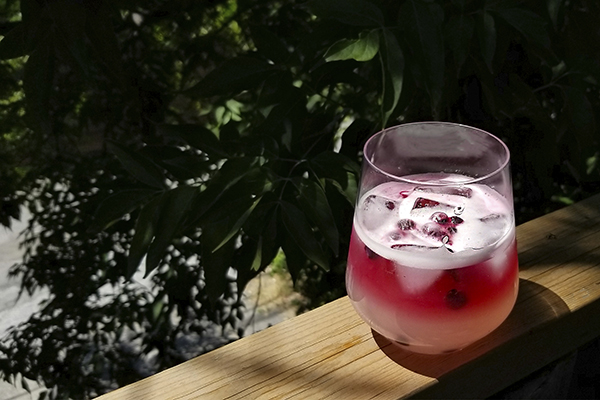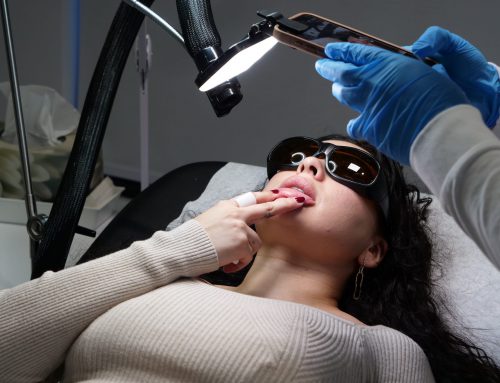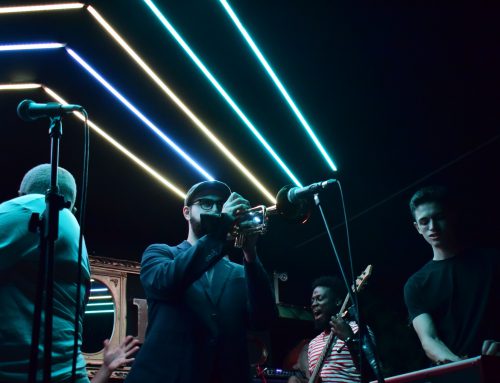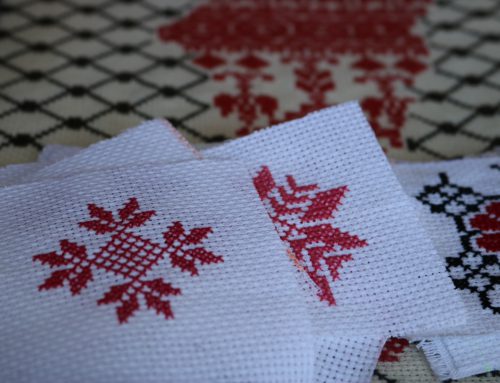BY Katelyn Thomas & Savannah Stewart
A couple of years ago, Zac Clarke decided he was done with drinking.
“My life has gotten significantly better, the anxiety, the fear, the depression, my will to live, it’s all kind of leveled out. I’m not great, but I never get as bad as I was before,” he says.
As the owner of successful St-Laurent Street restaurant Dirty Pizza, Clarke realized his livelihood depended on his ability to treat his customers with kindness and provide them with a pleasant dining experience. He didn’t feel like he could do that when he was drinking.
“There was like an emotional toll going through my daily life that was so heavy, where I just didn’t want to deal with anybody,” he says. “But because I owned a business, I had to.”
Clarke says often people who drink heavily when they are young end up growing out of it as adulthood forces them to become more responsible. But then there are addicts, whose consumption increases in conjunction with their stress levels. For some like Clarke, work is the greatest source of stress.
“But I had the gift of being unable to leave my job, as all my life was staked on it,” he says, citing his work as one of the reasons he decided to give up alcohol.
As Clarke moves away from his alcohol-ridden past, being around excessively drunk people is something he has come to resent. At work, his single staff member is also sober, and he says the two of them enjoy running an alcohol-free space.
When holidays roll around, Clarke turns to other alcohol-free spaces to celebrate.
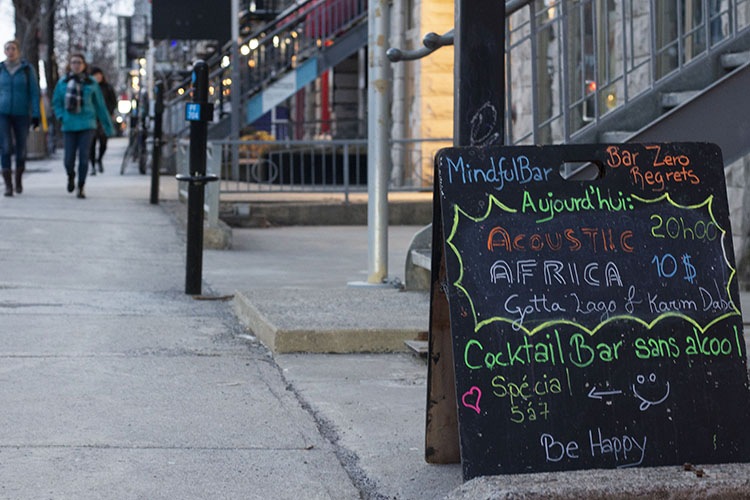
Mindful Bar advertises itself as Montreal’s only “zero regrets” bar, and hosts many live bands. Photo by Savannah Stewart.
“On New Year’s Eve, a lot of the parties and the things going on are alcohol and drug-based,” he says. “Me, my girlfriend, my best friend and his girlfriend, we just went to Mindful Bar for a couple of hours just to get through to midnight in a safe space.”
Mindful Bar is Montreal’s first alcohol-free bar and music venue, that provides people with the cocktails they love, sans booze.
Owners Diego Bayancela and Isabel Tames were growing frustrated with the city’s lack of sober spaces when it comes to nightlife, so they decided to open their own.
“Basically, we wanted the adult atmosphere of a bar: dancing, the dim lights… But removing what we don’t want: problems with alcohol that lead to violence, that lead to all the negative parts,” Bayancela says. “And we thought, ‘Yes, it’s feasible.’”
The idea for the project came about three years ago. They spent two years coming up with a business plan, applying for grants, and trying to get a feel for whether or not there was space for this type of venue in Montreal.
Discover Mindful Bar, Montreal’s only sober bar. Video by Savannah Stewart.
“It’s not like opening a restaurant or a coffee shop where you know what to do with that,” Bayancela says. “We are opening a new concept, so we weren’t sure 100 per cent how people would react to that.”
So far, the space has been met with enthusiasm. It’s the only one of its kind in the city, but they wouldn’t see other sober spaces as competition.
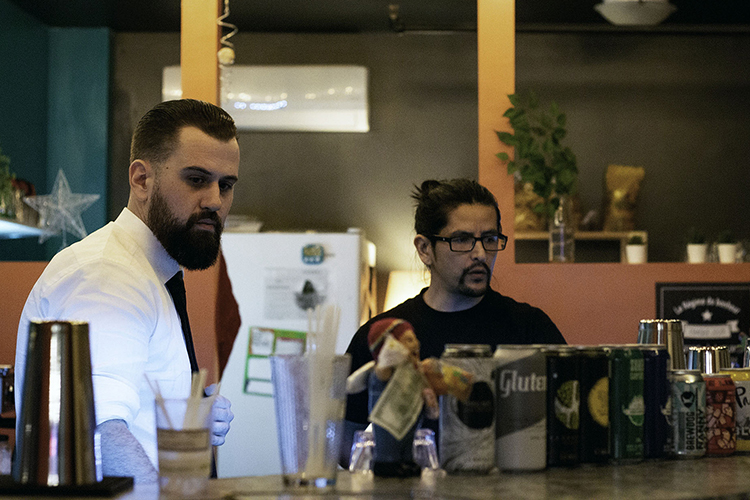
Co-founder Diego Bayancela created an intricate cocktail menu that is completely alcohol-free. Photo by Savannah Stewart.
“We don’t see it (as a threat),” Bayancela said. “We’re so limited, if it would have been 2,000 sober bars in Montreal, I would be a bit worried. But if it’s two or three, that would be amazing–we won’t feel so alone.”
In addition to offering a space for sober people to enjoy themselves away from alcohol, Dr. Roisin O’Connor, an associate professor of Psychology at Concordia University, says a place like Mindful Bar is an interesting opportunity for people to challenge their beliefs.
O’Connor studies heavy alcohol use among youth, particularly those starting and making their way through university.
“One of the things that I look at in my research is the effects of perceived norms,” she says. “So that is the belief about what other people approve of, or think is right in terms of drinking, and also what one perceives others are actually doing–how much they’re actually drinking.”
O’Connor says young people who drink heavily tend to think their peers are engaging in the same behaviours.
“This idea of an alcohol-free space is really interesting because it may influence—it has to influence—people’s norms then, because they’re surrounded by people at the same event who are not drinking,” she says. “That would be really interesting, I guess to see those effects.”
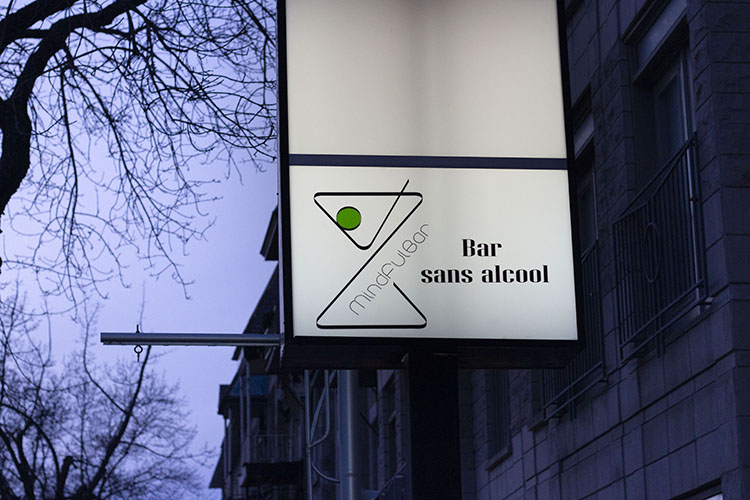
Mindful Bar is located on St-Denis Street in the Plateau. Photo by Savannah Stewart.
Another facet of O’Connor’s research focuses on people who drink to cope with negative moods or social anxiety. She explains that people with social anxiety often do go out, and do attend social gatherings because they want to fit in.
According to Drug Free Kids Canada, “Adolescence is an exciting time, but it can also be a time where peer pressure, boredom, risk-taking, and the need to ‘fit in’ become important factors in a teenagers life.” Naturally, this leads them to following others into social settings like bars or nightclubs, Roisin says. They drink to take the edge off, as a crutch to get through an otherwise uncomfortable situation.
“But an alcohol-free space would provide that natural opportunity for them to challenge those beliefs,” O’Connor says. “Their friends drag them along to this new bar, and they can’t drink…”
O’Connor explains that there are many factors that contribute to a person’s drinking habits, so while Mindful Bar may allow people to question norms, research would have to be done to assess its true impact on drinking culture as a whole.
According to the Canadian Institute for Health Information, citing data from 2015-16, “Nearly 3 out of 4 hospitalizations entirely caused by alcohol are due to mental and behavioural disorders, such as alcohol dependence and intoxication.”
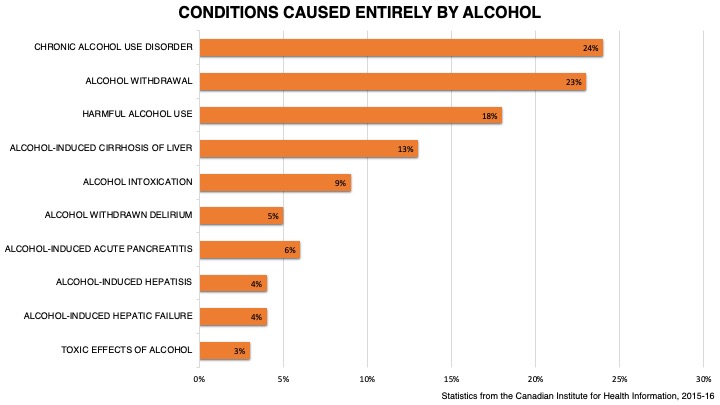
Alcohol consumption is linked to many different problems. Media by Katelyn Thomas.
Could spaces like mindful bar potentially impact drinking culture?
“It definitely seems to have that potential,” O’Connor says.
Other members of the sober community agree.
“I believe (alcohol-free bars) would help promote a healthier and safer lifestyle, and show younger people that there are more than enough ways to go out and have fun with friends without needing to have a drink at the same time,” said James Foster, an overnight newscaster at CJAD 800 who’s been straight-edge since he was a teen.
Foster decided to quit drinking early on, around the age of 16, because of how expensive alcohol is. At the time, he was also listening to punk bands who promoted the straight-edge lifestyle.
“When you’re 15 to 16, you’re just drinking because it’s something you’re not supposed to do,” Foster says. “Once you’re old enough it—in my opinion—just seems like such a waste of money.”
Foster says an alcohol-free space also has the potential to make social gatherings less awkward all around—for those who drink and sober people alike.
“As someone who, for years, was the only one in a group of friends who didn’t drink, it can be awkward being the sober guy when no one else is,” he says. “And from the other perspective, it can be awkward inviting the straight edge guy or gal along when you know you’re getting tanked. Alcohol free spaces give a great space for everyone.”
For now, Mindful Bar bears the title of Montreal’s first and only alcohol-free bar. However, they could face increasing competition as more and more bars introduce non-alcoholic drinks for a generation that’s drinking less than those that came before.
